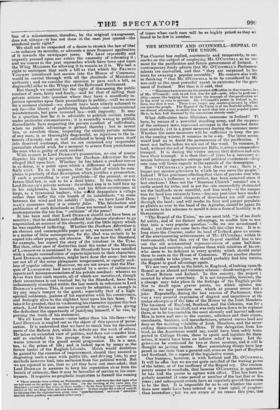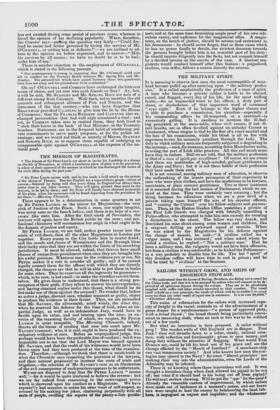THE MINISTRY AND O'CONNELL—REPEAL or
• THE UNION.
THE Courier has replied, courteously and temperately, to our marks on the subject of employing Mr. O'CoNstemeas an inns ment for the pacification and future government of Ireland. ( contemporary freely admits that Mr. CI'Coetrmr,s's Parliament talents are unrivalled, and that " they are surpassed by his lents for swaying a popular assembly." He concurs also with in thinking " that Mr. O'CONNELL is to be considered by Mi ters only as the most powerful agent in existence for the govt. ment of Ireland." But then it is.said, that 4 • • I' Ministers have overcome the greatest difficulties in. that country, in s of Mr. O'Connell : and, to ask him now 6ir aid—now, when he professes 1 tility—seems like begging him to share the triumph of that pacification wl he has tried in vain to prevent. Mr. O'Connell's power in Ireland is, we lieve, less than it was. There is no linger any master-grievance by which can move the people. The Repeal of the Union is of too doubtful utility, an too distant advantage, to enable him to work that into a very popular questi He is, in fact, half disarmed by the concessions already made."
What difficulties have Ministers overcome in Ireland? TI have, by means of a powerful standing army, and the suspend of the ordinary laws, repressed outrages in the disturbed -distri (not entirely, yet in a great measure)-during the summer mewl Whether the same measures will be sufficient to keep the pea in the corning winter, it remains to be seen. The latest anew would lead us to doubt the permanence of the pacification. V must not halloo before we are out• of the wood. In summer, II land, without the aid of Suppression Bills, is always comparative tranquil. It is during the winter season 'that distress and crin have their triumph : it is then that—if there be a necessary ce nexion between agrarian outrage and political excitement—de:4p rate men will listen eagerly to the appeals of the demagogue. But " O'Coeveee's power is less than it was ; there is
longer any master-grievance by which he can move the people:- Indeed ! What grievance affectingthat class of persons over who
O'Coersreee's influence is so potent, has been removed since tl.
last elections? Does not the "Sinecure Church" remain ? are n cattle seized for tithe, and is not the successfully obstructed
are the landlords more merciful, and less needy—is the compel tion for land less ruinously keen—has any provision been made f. the poor ?• The usual elements of discontent are still . scatter( through the land ; and will render its fiery and pauper populatio. as pliable as ever to the hand of the Agitator; should he again fin it suitable to his schemes to mould it into a form of hostility to tl, Government.
"The Repeal of the Union," we are next told, "is of too doubt ful utility, and. of too distant advantage, to enable him to won that into a very popular question."—So we are accustomed I.
think; yet there are some facts: that tell the other way. It is xi( long since the Courier, under its head of Ireland, gaSe an accone
of the electioneering achievements of 'Mr. O'CoNNELL within th twelvemonth, when this cry of the Repeal enabled him to tun out the old aristocratical representatives of some half-doze boroughs and counties, and replace them with relatives of his owl. who seem to be deficient in every quality which should entitl. them to seats in the House of Commons. Were another electioe unexpectedly to take place, we should probably find him turning. the Repeal to good advantage again.
We are very much in the habit, in England, of looking upon tits Repeal as an absurd and visionary scheme—disadvantageous alike to Great Britain and' Ireland. In this country, the projeat i scouted by almost everybody. It is not impossible, however, the a change may take place in the feelings of the English public
Not to dwell upon graver points, on which opinion mat change, we may mention one, which at present seems but a joke. Repeatedly, (hiring the last session of Parliament, then was a very general expression of disgust and impatience at the undue absorption of the time of the House by the Irish Members.
The business of England, Scotland, and the Colonies, was for a long time laid on the shelf, and was only taken down 'tole replaced there, or to be transacted in the most slovenly and hurried rodunee.
Men in town and men in the country, solicitors and their clients, merchants, bankers, and manufacturers, uttered curses loud and deep on the untiring volubility of Irish Members, and the never- ending discussions on Irish affairs. If the delegation from Le- land, as the Americans would say, could have been safely trans- ported to College Green, _there to spout and legislate for them
selves, it would have been an infinite relief to many. Let thi: grievance be continued fcir two or three sessions, and it will ter
thought no jesting matter. More astonishing things have hap- pened in our time than a general call, even on the part of England and Scotland, for a repeal Of the legislative union. Our business, however, is with Ireland and Mr. O'CONNELL- It will lie•seen :hat we are not quite satisfied of the waning power of the latter, or of the inefficacy Of the Repeal cry. Our contenas
porary seems to conclude, that because OCONNEAL is quiescent, he has host the power to agitate with effect. This has been re.
gularly asserted at some period or another of the last four or eve'
years ; and subsequent events have as regularly proved the reverse to be the fact. it is. impossible for us to say whether the asser- tions now made have been uttered in a truer spirit of prophect than heretofore ; -but we are aware of no reason this year, that
has not existed during some-period of previous years, whereon to found the opinion of his declining popularity. When, therefore, the Courier says—putting the question very fairly—" Could Ire- land be easier and better governed by hiring the services of Mr. O'CoNNEnt, or setting him at defiance?"—we are inclined to ad- here to the opinion we 'before expressed, and to answer—" Hire his services by all means; we have no doubt he is to be had; make him of use."
There is another objection to the employment of O'CONNELL, which is stated in the following passage.
" Our contemporary is wrong in supposing that Mr. O'Connell could ever loll in comfort on the Treasury Bench between Mr. Spring Rice and Mr. Stanley. The personalities which have passed between these two gentlemen have been too many and too pointed ever to be overlooked."
Oh no! O'CosusEta. and COBBETT have exchanged the bitterest terms of abuse, and yet now who such friends as they? A y, but, it will be said, Mr. STANLEY and Mr. SPRING RICE are men of a different stamp from CoRBErr. Well then, not to mention the old quarrels and subsequent alliance of Fox and NORTH, and the statesmen of the last century,---who can have forgotten that BROUGHAM provoked CANNING to give him the lie in the, House of Commons; that Sir FRANCIS BURDETT and CANNING also ex- changed personalities that had well nigh occasioned a duel ; and yet, as CoBBETT takes care to remind them, they both lived to " stick their knees in the back " of that Minister on the Treasury benches. Statesmen are in the frequent habit of smothering pri- vate resentments to serve party purposes, or for the public ad- vantage; and we would not think so meanly of Messrs. STANLEY and SPRING RICE, as to suppose them capable of indulging an unappeasable spite against O'CoNNEnn at the expense of the na- tional good.

















 Previous page
Previous page